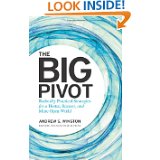It’s a mistake of historic proportions for the U.S. to pull out of the Paris Climate Agreement.
Once again, forgive me for stepping out of my “business person” role and speaking as a concerned American citizen.
The world needs U.S. climate leadership…

America can lead on climate change solutions.
Experts ranging from scientists to economists to business people explain in blunt, clear times why the U.S. will be the great loser here. China and European nations will step into the vacuum of climate leadership that we – inexplicably – have created.
That agreement, signed by 195 countries in 2015, put the world on a path to reducing the greenhouse gas emissions that are causing our world to warm to a dangerous and unhealthy degree. One of the reasons I launched Great Green Content back in 2011 was because I had done my own reading and learning about climate change. (It helps to have MIT business school professors to call up and ask, “Can you show me the climate models?” – and they do!)
… to help meet climate change risks
I was stunned that a threat so serious was so poorly covered by the media. And as an MBA with a corporate career that spanned multiple industries, I saw first-hand the often-tepid efforts that companies make to address a problem that may leave them with both no business – and no customers. This despite the fact that – like most problems – the solutions to climate change will create jobs: from wind turbine technicians to solar panel installers and more.
Climate change drives floods, droughts, wildfires, hurricanes and other severe forms of weather. It kills the crops that feed people, enables deadly infectious diseases to spread far beyond their geographic origins, and causes billions of dollars in property damage every year. It’s a “threat multiplier” according to the U.S. military. It’s a business risk that more and more investors demand that corporations report on.
The future – if we are to have one – has to be green

Green jobs are the future.
Today I am speaking as a citizen, a wife, a mom, a neighbor, a member of my community. This decision will not create one new job here. It will simply make us – and our global neighbors – less safe in the months and years ahead.
I will ignore this decision and push on with what I know needs to be done. Join me!

